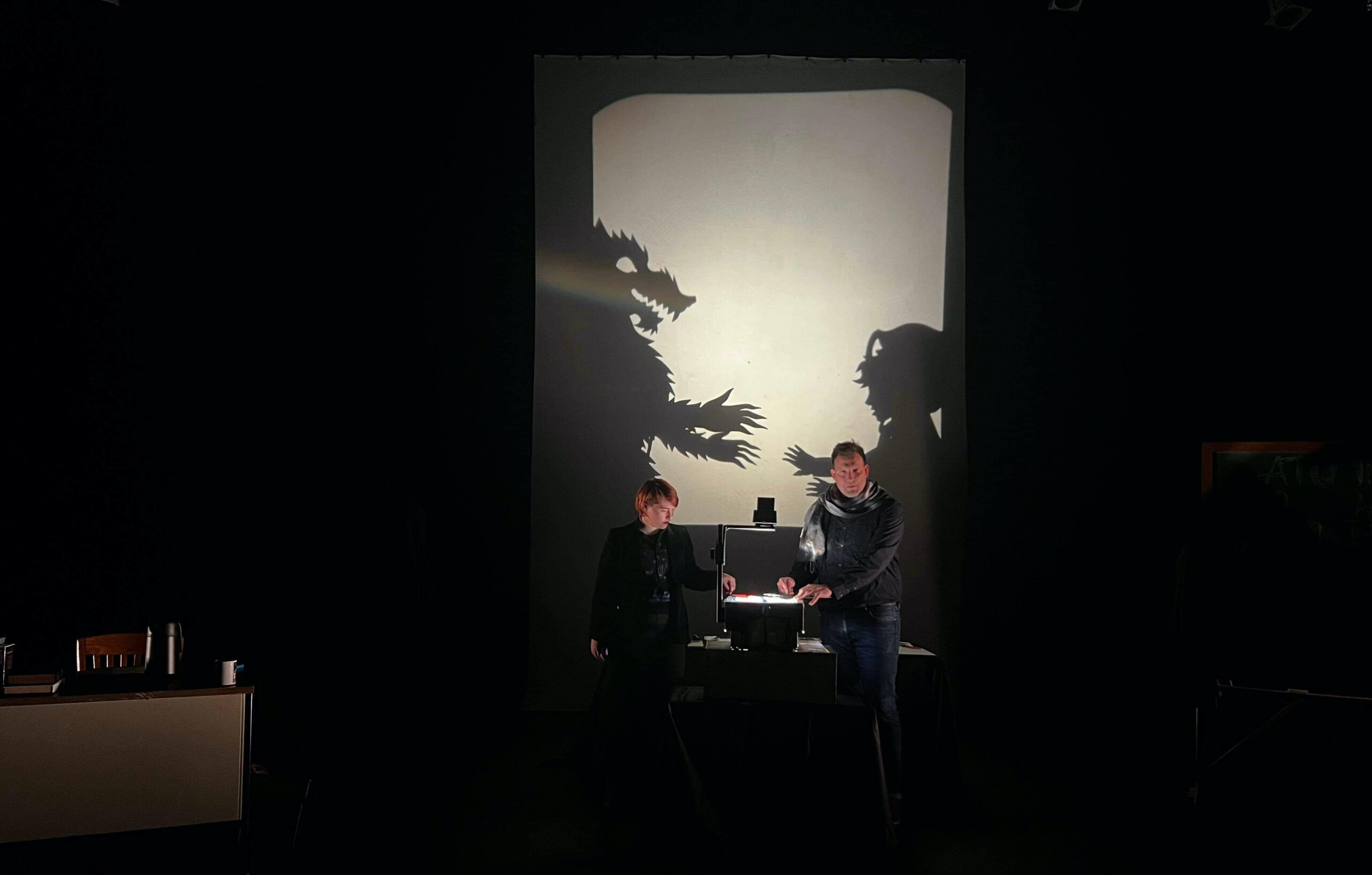Michael Legg, Director of the ATL A/I Company
Photo-Justin Philalack
Actors Theatre of Louisville’s Apprentice/Intern Company
Interview by Scott Dowd. Entire contents ©Fearless Designs, Inc. All rights reserved.
What would you do if you won the lottery? It is rare, but it does occasionally happen that one fortunate individual has the opportunity to live out his or her lottery fantasies. It happened last June to Roy Cockrum of Knoxville, Tennessee. He bought a Powerball ticket and won nearly $260 million dollars. Even after taxes and lump sum payout, that left a considerable amount of money for the retired actor/stage director to enjoy. After receiving the check, Mr. Cockrum announced his intention to give back to the world and established The Roy Cockrum Foundation to facilitate that wish. Among the first grants announced by the new foundation is $1.2 million dollars to support the Apprentice/Intern (A/I) Company at Actors Theatre of Louisville, of which Cockrum had been a member in the late 1970s. The grant is to be paid out over the next decade, which is significant to ATL managing director Jennifer Bielstein because “…it ensures that we can support a diverse pool of talented candidates over time.” As Actors Theatre prepared to open its 2015-2016 theatrical season (the fifty-second season for the Tony Award-winning theatre and the forty-third year for the acclaimed Apprentice/Intern program), Jennifer Bielstein, managing director, and Michael Legg, director of A/I, spoke with me about the program and the impact of Mr. Cockrum’s altruism.
Jennifer Bielstein: The Apprentice/Intern (A/I) Company is an amazing training program—for people early in their careers primarily, although any ages are welcome. It is open to people who are planning to become actors or who want to work behind the scenes in theatre.
Scott Dowd: Could you give us some of the options for behind the scenes?
JB: We have interns interested in directing, marketing, development, working in the scene and costume shops, to give just a few examples. We have roughly forty participants in the program in a given year. It’s incredible the depth of experience it gives them and the network they build through interactions with all of the professionals with whom they work throughout the season.
SD: When does the A/I Company season begin?
JB: They arrive in mid-summer and are here through the end of our performance season in mid-April.
SD: Why does Actors Theatre invest so much in this program?
JB: It’s a really important part of this organization’s culture. I think of us as a teaching organization. We have a real bent toward educating and training. But the infusion the organization receives each year from these forty young minds is incredibly valuable to an organization that strives to remain on the leading edge of our industry. We learn from them as they look at the organization with fresh eyes; they lend their perspective on our organization, and we are able to get a sense of the future of theatre through their work.
Michael Legg: It’s the theatrical equivalent of a teaching hospital. I also talk about it as one of the country’s few fully immersive, practical training programs. It’s designed to help you survive the first five years of what will be a tremendously difficult career.
SD: I’ve seen some statistics about it, and this program has demonstrated success.
ML: That’s true. We have less than two percent attrition after five years.
SD: That is amazing.
ML: It is, especially compared with B.F.A. and M.F.A. programs. As many as 50 to 80 percent of the graduates from those programs are not working in the business five years out.
SD: Having that Actors Theatre of Louisville credential on your resume is also a big help to those who want work.
ML: The program has a national reputation. When people see that on a resume, they know they’re getting folks who have been trained in what it means to work in a regional theatre and in a large institution.
JB: They know that these people have been part of something special. Works that we are premiering are being performed every year around the country and the world.
SD: Give me a thumbnail of a day in the life of an apprentice/intern.
ML: It’s hard. I’m not going to lie about it. What’s nice is that the A/I group serves as a small theatrical company inside the larger organization. We model the kind of new play development the theatre is doing on a smaller scale. The A/I Company has its own season of shows separate and apart from the theatre’s main stage season. It focuses entirely on new works.
SD: I bet a lot of people don’t know that.
ML: I bet a lot of people don’t. Over the course of the season we will perform in all three of the theatre spaces here at Actors: the Pamela Brown, the Victor Jory and the Bingham Theatre. We also do a lot of site-based work. In the past we have done plays in a parking garage, houses in Old Louisville, the community center in Central Park, and even in cars! We will go all over Louisville. We have even done plays in elevators. We are trying to teach them the skills that are necessary to create work. If nobody is offering them work after they leave here, they will know how to create their own.
SD: That is a very important skill. So many young actors are stymied if they aren’t cast at the cattle call audition.
ML: They are learning to function as a theatre company. Our apprentices are our actors, but our interns are serving in all the support functions for that season. Our directing interns are directing, our literary interns are the dramaturges, our stage management interns are stage managing, our development intern is helping us raise money to produce the shows, and our marketing intern markets the entire season. There is a function for everybody on that team.
SD: The producing intern is going to be really important to the success of a season!
ML: We started that about four to five years ago. That intern reports directly to us. Not only are they working as producers, but they’re also coordinating our recruitment tours.
SD: What does that entail?
ML: They coordinate around 2000 auditions for the company for the next year.
SD: This sounds really exciting for people who appreciate experimental theatre. How do people find out when to be part of A/I shows, assuming it is open to the public?
ML: That’s the nice thing about the A/I season—it is free and open to the public, with the exception of their show at the Humana Festival. We advertise all of their company shows on the theatre’s website, actorstheatre.org. If someone joins the Actors Theatre Facebook group, we post performance notices there.
JB: I also encourage people to sign up for our e-mail list to receive information about everything that’s going on at Actors Theatre of Louisville.
ML: That is the best way to find out.
JB: One unique thing we do for the A/I Company in terms of launching their careers is the commissioning of a piece for them that is a professional work included in the Humana Festival of New American Plays. Often this involves multiple writers in collaboration. We then bring in agents from New York, Chicago, Los Angeles and other communities to see their work during the Festival. We also have special showcase opportunities for the apprentices during which they each do a short scene with another apprentice. We provide numerous networking opportunities for the interns to package their talents so that their experience is profiled for potential employers.
ML: Apart from the season, there is a curriculum that spans the entire season focused solely on helping them learn and develop the skills they will need to have the best shot possible of getting a job after they leave Actors Theatre.
SD: So there is more to the program that learning by osmosis.
ML: There is a lot of observational learning involved. We have an open rehearsal policy and we encourage them all to get into those rooms and watch the professionals work every single day. There is a work-study component for all the opportunities and the learning they receive, which is also educational in that they are “running crew” for the shows. Even there, they get to watch professionals working under pressure every night.
SD: I did a little research into the grant process of The Roy Cockrum Foundation and found that you must be invited to apply. Jennifer, how did that invitation come about?
JB: A really wonderful element of this whole story is that Roy is a former apprentice. He was here in 1978-79. This shows the impact of the program on people’s lives. Roy now has the ability to give back to the world and he had chosen to give to theatre. He and the executive director of the foundation came to this year’s Humana Festival to meet with Les Waters, Michael and me. They then became fully immersed participants in the Festival. They saw all of the shows; went to all of the parties, panels and extracurricular events; and were really inspired. Roy was clearly impressed with the leadership Michael has brought to the program. From his comments, I think what we have been discussing in terms of preparing these apprentices and interns for the real world is one of the things with which he was most impressed. They were also clearly impressed by what they saw on stage.
SD: The grant is $1.2 million dollars to be paid over a decade—quite a commitment!
JB: From a grant recipient perspective, it’s unusual to get that level of commitment. It’s wonderful if someone will give you three years, but it is challenging to make it a sustainable source of revenue within that time frame, or to find ways to replace it. Ten years is amazing and, we hope, it may set an example for other potential grantors.
SD: What will you be able to do that you haven’t in the past?
JB: It’s allowing us to double what we are granting to every apprentice and intern. It also allows us to employ Michael Legg and assistant program director John Rooney full-time. They have been on ten-month contracts to this point.
SD: What will you do with the extra time?
ML: This will allow me to do some long-term planning. I will be able to take the amazing growth we have experienced during my first eight years and build on it. I will get to spend some dedicated time in the summer focusing on how to grow the program and its reputation, as well as strengthening our recruitment efforts. I’ll be looking at ways to bring in a company that’s even stronger and more diverse than those that have come before.
SD: Will it assist with diversity—to allow someone with no resources to participate?
ML: Remember that we are an M.F.A. alternative. What’s lovely about this program is that you’re getting all of the training and exposure and ten times the contacts that you would receive from a traditional M.F.A. program, without tuition. I know a lot of people coming out of those programs with six-figure debts. That’s just criminal. So we’re offering the opportunity to get all of that in a third of the time with zero debt. I will also say this: Having moved here from New York City, Louisville is an amazing town! The cost of living is very friendly. I do think the grants they will be receiving thanks to Roy and the foundation’s generosity are going to allow them to be very comfortable, cover their housing expenses and let them live in such a way that is manageable. They may even be able to store up a little money to help them pay for the move to wherever they go next.
SD: Right, they don’t all head straight to New York City or Chicago, do they?
ML: Large percentages of them do. But we are proud of the fact that we teach folks coming out of this program how to sustain a career outside the main industry hubs. We have former apprentices and interns working in the Seattle/Portland area, Minneapolis, Milwaukee, Austin, Orlando, Boston, Washington, D.C. You name a major theatre city in this country and we have people who have landed there and are making good names for themselves.
SD: And if Roy Cockrum is any indication, they don’t forget where they came from.
ML: Yes. We have actors working in every major regional theatre. We have several interns on staff at most of the major regional theatres. We have had apprentices on nearly three dozen television shows. They are doing good work.
JB: This past season Actors Theatre of Louisville hired thirty-nine past interns or apprentices!
SD: That must be gratifying.
JB: It is always great to reconnect with them.
ML: It is really exciting to have them here for the current company. They give that extra reinforcement when the new interns and apprentices can see people who have gone out of the A/I program and been able to come back to Louisville and actually work here at Actors!
Actors Theatre of Louisville opens their 2015-2016 season September 1 with August Wilson’s Seven Guitars. Season tickets are still available online at actorstheatre.org or by calling Actors at 502.584.1205. The Brown-Forman Series of seven plays starts at $130 per person. Pick any five plays from the Brown-Forman Series, Humana Festival or holiday shows and receive the best available seats at the time of purchase for as little as $185, or choose any three plays starting at $126.





